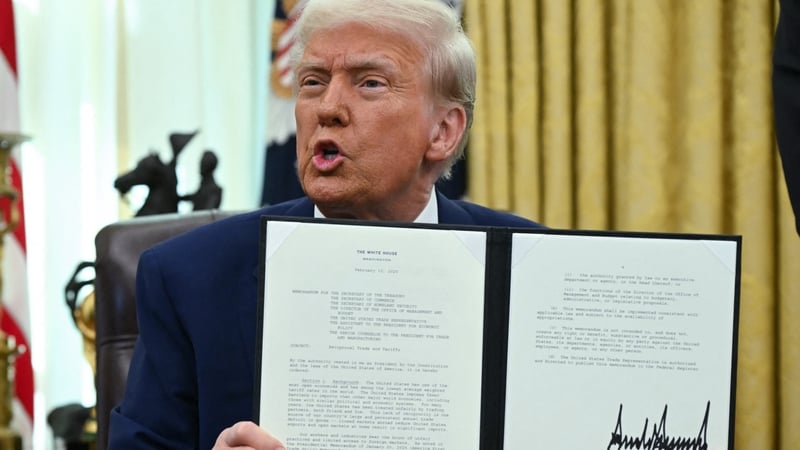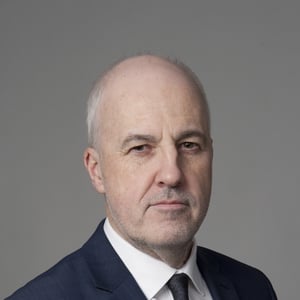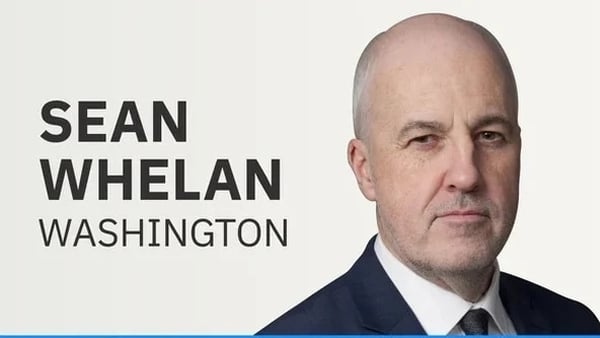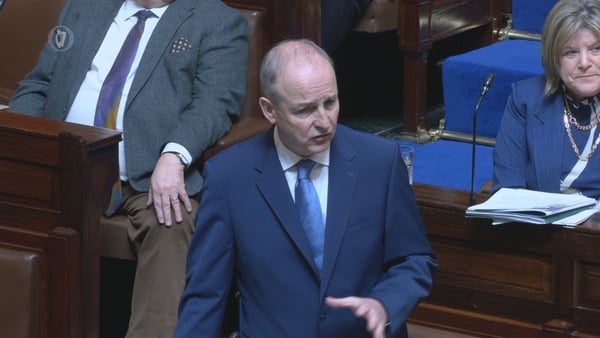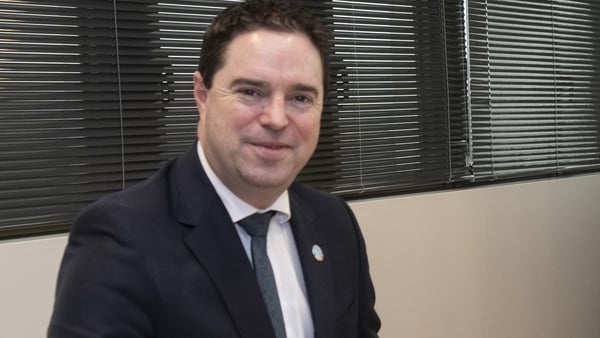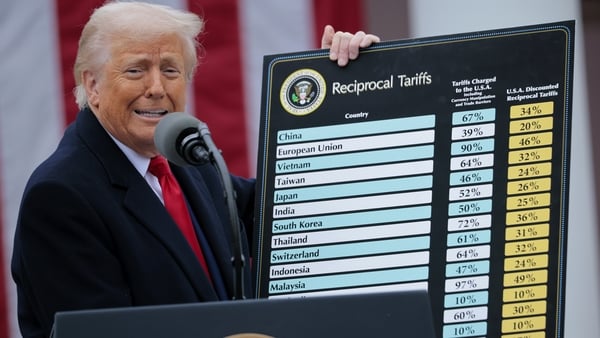Why is Donald Trump raising tariffs? I don't know: nobody does for sure. Except possibly a small group in the administration.
No doubt they will explain it to us later today when the president and his cabinet gather in the Rose Garden of the White House to make their announcement around 9pm Irish time (that's 4pm US time, after the stock markets close).
The White House is billing it as a "Make America Wealthy Again" event.
In the meantime we can look for clues in what the president and his cabinet members and senior advisers have been saying over the past couple of months ... but the signals have been so contradictory that frankly it's a fruitless exercise. Better to just wait and see.
And even when there have been hard announcements - like the tariffs on imports from Canada and Mexico - they have often been walked back, or suspended, or modified.

There has been so much change in such a short period of time that some publications have set up tariff-watch charts, to help readers track the announcements and changes and impacts. These charts are about the only tangible thing to come out of almost two and a half months of "policy" on trade.
The last word came from the president himself a week ago, having spent a lot of previous announcements talking tough, like a 200% tariff on EU alcoholic drinks.
Mr Trump said of the tariffs: "...I think people will be impressed. We're going to be very fair. We're going to be very nice, actually. We have not been treated nicely by other countries, but we're going to be nice. So, I think people will be pleasantly surprised.
"But it's going to make our country very rich because we're the piggy bank that everybody steals from. And they've been doing it for many years, for decades. So we're not going to let it happen.
"But we're going to treat people very nicely. We're going to treat other countries very, very nicely. And I think it's going to have a very positive effect on everybody, including those other countries."
What does that mean? Who knows. We just have to wait and see. It could mean the tariffs will be much lower than the 20% EU Trade Commissioner Maroš Šefčovič expects, or the 18% US stock markets expect. Then again maybe not.
Later in the same signing session, the president told journalists: "Now we're going to make it (reciprocal tariffs) all countries, and we're going to make it very lenient. I think people are going to be very surprised. It'll be, in many cases, less than the tariff that they've been charging us for decades. So I think people are going to be very, very surprised."
Maybe it's just a straightforward tax raise on foreign imports - with nothing more to it than that.
The US has a massive public debt and a yawning 6.5% budget deficit (that's more than twice the annual borrowing amount allowed by EU fiscal rules).
They need to cut spending - that's what DOGE is doing in its crude way - but raising revenue is also going to be needed in a balanced approach.
So how do you raise taxes without directly raising taxes on US citizens and companies - and pay for an extension of the corporate tax cut from 2017 that expires this year?

Maybe this is the revenue raising bit - tax imports at a level that will rake in some meaningful cash but not do too much damage to consumers. Lie and spin about the impact on the economy, wait for consumers and firms to adjust (as they always do), and blame foreigners if things go wrong. What’s not to like?
On Sunday, Mr Trump’s economic adviser and a hawk on tariffs Peter Navarro was asked on Fox News to respond to claims that the tariffs will drive up inflation and the cost of living for ordinary Americans. Wrong, he said: the US market is so important for foreign exporters that they will adjust their own prices to absorb the tariffs in order to stay in the US market.
"The reason we are not going to see inflation is because the foreigners are going to eat most of it - they have to," he said.
It's an argument that gets a bit overlooked in the zero-sum view of trade (if they win, I must lose).
Exporters can and do adjust prices for the markets they are serving, to accommodate local taxes and market conditions (the European Commission's annual tables of the pre-tax price of cars in the 27 states of the EU as a percentage of the average pre-tax price is informative in this regard - even within a single market: when I used to regularly look at it, about 20 years ago, the pre-tax price of a VW Golf was higher in Germany than it was in Ireland, with its crushing Vehicle Registration Tax.)
So manufacturers can take some price pain to keep selling product. This sharing of the tax pain even has a name in economics - tax incidence.
How the pain is shared depends on how sensitive the demand is to price change. Cigarettes are the classic example: smokers' addiction is pretty impervious to price rises, so cigarette companies pass on all of the extra taxes charged in the budget each year.
For the Irish economy, a more relevant example is prescription medicines, as pharma products make up about two thirds of the value of Irish exports to the US.

They too have a pretty constant demand that seems to defy price rises: sick people will pay what it takes to get better.
In Europe, states club together in buyer "baskets" to negotiate deals with pharmaceutical companies. Here in the US, States and the Federal Government are largely precluded from negotiating bulk discounts.
Prices are consequently higher than Europe, sometimes staggeringly so. And there is the cost of advertising prescription drugs directly to consumers. TV ad breaks here are stuffed full of pharmaceutical ads, which Donald Trump’s health secretary Bobby Kennedy Jr, says he wants to outlaw. That ought to increase the scope for either cutting prices or absorbing tariffs on drugs made outside the US.
The president has spoken many times about Ireland swiping the US-owned pharmaceutical industry, and says he wants to encourage this industry to move production back to the US.
Industry observers say it's not a simple thing to do - factories have a long lead time, and spare capacity is either in short supply in the US or cannot be easily repurposed.
The long run hardly matters to Mr Trump. In the short term he needs cash for his tax cuts and budget recasting - tariffs are one way of getting extra revenue, and the Irish-based pharmaceutical industry may be a golden goose ready for plucking - too fat to move quickly, unable to leave behind the rich feed in the US market.
For this investment cycle at least, it may have little option but to pony up the tariffs to Washington, "sharing the burden" with consumers where it can, sucking up the pain where it must. Either way big pharma will get little sympathy from the American public.
This will, of course, be a lot harder for small producers and less profitable industries to manage - or even bigger producers of products that are very price sensitive and where margins are already compressed.
Agricultural products are an obvious area. Again the president has spoken of a renaissance for US farmers driven by tariffs, telling them to get ready to sell more food to US consumers.

The US now accounts for about a quarter of Irish butter exports and has seen rapid growth in recent years as consumers develop a taste for the richer European-style butters, of which Kerrygold is the market leader in imported high end butter.
Already a premium price product in a sector in which there is plenty of consumer choice, passing on the cost of any tariffs will be hard, as will be swallowing the cost.
And yet that seems to be what at least some in this administration are banking on. As Mr Navarro told Fox News: "We’re the biggest market in the world, and they have to be here. And so they are going to cut their prices to absorb that."
Mr Navarro claims the US government will raise about $100 billion a year from automobile tariffs, and a further $600 billion a year from tariffs on everything else.
For opposition Democrats, it's a tax hike that they say will be borne by American consumers, not shared with the manufacturers and importers:
"This will be the biggest tax hike on American consumers in modern history," Senator Mark Warner of Virginia said yesterday.
Maybe it will be - or maybe it will mainly fall on foreign companies keen to keep selling into the US market, as Peter Navarro claims.
So we are left with uncertainty. And that is not a popular thing.
Businesses don’t like it because they make investment decisions around their understanding of certainty: when uncertainty increases, their appetite for committing large amounts of capital goes down. Which seems to be the opposite of what the president wants. He wants companies to invest more in the US, but until there is a greater level of certainty, they will not. Brexit is a clear example of that.
So business in the US and outside it want some certainty later today. Will they get it? Probably not.
My best guess is that this announcement will be the opening position in a negotiation - a slow, complex and complicated one - until Donald Trump gets what he wants, or the US economy is in such bad shape that he takes whatever he can get and declares victory.
Soft indicators, like consumer sentiment surveys, are increasingly pointing to recession risk in the US economy in the second half of the year.
The stock market has had a very bad last six weeks. And gold has apparently enjoyed its best opening quarter since 1974, up 18% in three months to hit a new record price of $3,127 per ounce - all on fears of the damage a global trade war driven by Donald Trump's tariffs could do.
Much, but by no means all, will be revealed in the Rose Garden tonight.
